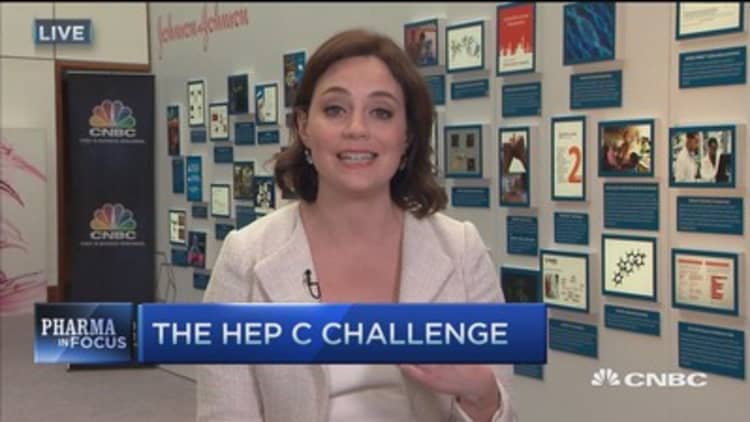A year ago, Express Scripts told a room filled with representatives of hundreds of health insurance plans about its designs to lower costs of new hepatitis C medicines.
By December, the announcement came. The pharmacy benefits manager negotiated a discount to offer an AbbVie regimen exclusively, at the expense of those from Gilead and others. The news rocked the biotech world: A new pricing paradigm had arrived.
This year at Express Scripts' annual meeting, the topic was cancer drugs. The idea: Pay more where drugs have been proven to show more benefit, less where the drug hasn't proven to work as well.
Express Scripts Chief Medical Officer Dr. Steve Miller said he believes the plan will lower overall costs.
"Right now we're paying top dollar for every indication, whereas when you have an indication where the benefits are really marginal, we probably should be paying less for that indication," Miller said in a telephone interview.
Read MoreSpecialty drug spending sees record increase
Miller pointed to Tarceva, a drug approved for lung and pancreatic cancer, cited also in an earlier Wall Street Journal story, as an example. The medicine, from Roche and Astellas, has been shown to extend life by a couple weeks in pancreatic cancer, and a few months in lung cancer.
"It's 10 times better in lung," Miller said. "Can you name any other product you'd buy where you pay the same price regardless of a 10-fold difference in how well it works?"
Miller declined to say which drugs Express Scripts would focus on initially, but said the strategy will roll out with its 2016 formulary plan, which will be detailed at the end of this summer. Express Scripts is the nation's largest pharmacy benefits manager, negotiating drug prices on behalf of insurers and employers.
Read MoreObamacare's overhead: $273.6B
"The response has been overwhelmingly supportive" from the insurance plans Express Scripts works with, Miller said. "We've already signed up literally millions and millions of lives through our plan sponsors."
Oncology medicines are the largest category of drug spending globally, at $74 billion in 2014, according to industry researcher IMS Health. Pressure has been mounting on drug prices for years, as new therapies are routinely priced at more than $10,000 a month per patient.
"We've got to start dealing with the fact that when a drug's not working, we can't say that this is a drug for all patients with the disease," said Sam Waksal, who founded cancer drug developer ImClone and is now CEO of Kadmon. "That's where precision medicine is beginning to come in."
Waksal wrote an op-ed titled "Pay Only for Drugs That Help You" three years ago in which he advocated a similar idea.
Read MoreMedical cost inflation hits 8-year high, but why?
"We need to separate out those who benefit from a drug and those who don't," Waksal wrote in the March 2012 piece in The New York Times. "When a drug works, patients and insurance companies should pay the full price. When it doesn't, they should pay nothing."
Express Scripts is taking multiple approaches to lowering the price of cancer drugs. For the first, it is focusing on different indications (lung versus pancreatic, for example) where it will seek the advice of outside experts, Dr. Steven Pearson, of the Institute for Clinical and Economic Review, and Dr. Peter Bach, of Memorial Sloan-Kettering Cancer Center.
Bach was one of the architects of a high-profile decision by Memorial Sloan-Kettering in 2012 to not prescribe a new cancer drug from Sanofi and Regeneron, Zaltrap, for colorectal cancer, because it cost twice as much as a similar medicine but hadn't proven to work better.

"I need a third-party expert to tell me what the value should be of the drug, because obviously as Express Scripts we have a vested interest," Miller said.
A second part of Express Scripts' plan is to focus on how well drugs work for each individual patient, which requires diagnostic testing upfront and monitoring along the way.
"We're trying to help the pharmaceutical companies and the industry figure out what are those right patients and get the diagnostic reimbursed," Miller said. "We told our plan sponsors if they want to participate, it may cost more upfront to do the right testing. We'd assist them in making sure the right test was performed and the appropriate therapy was given."
So if Express Scripts plans to reimburse less when drugs have proven to be less effective, does that mean it will pay more than it currently does when drugs work well?
Not necessarily, according to Miller.
"If there's ever a case when a company underprices their drug, we'd have to be willing to admit that, too," he said. "I suspect that's a really rare circumstance, where they've underpriced their drug."
In the meantime, the pharmacy benefits manager plans to continue its tried-and-true strategy of targeting drug costs: pitting competing medicines against one another.
"Even in cancer, that's becoming more of an option," Miller said. "We're still going to aggressively go after price whenever possible."

